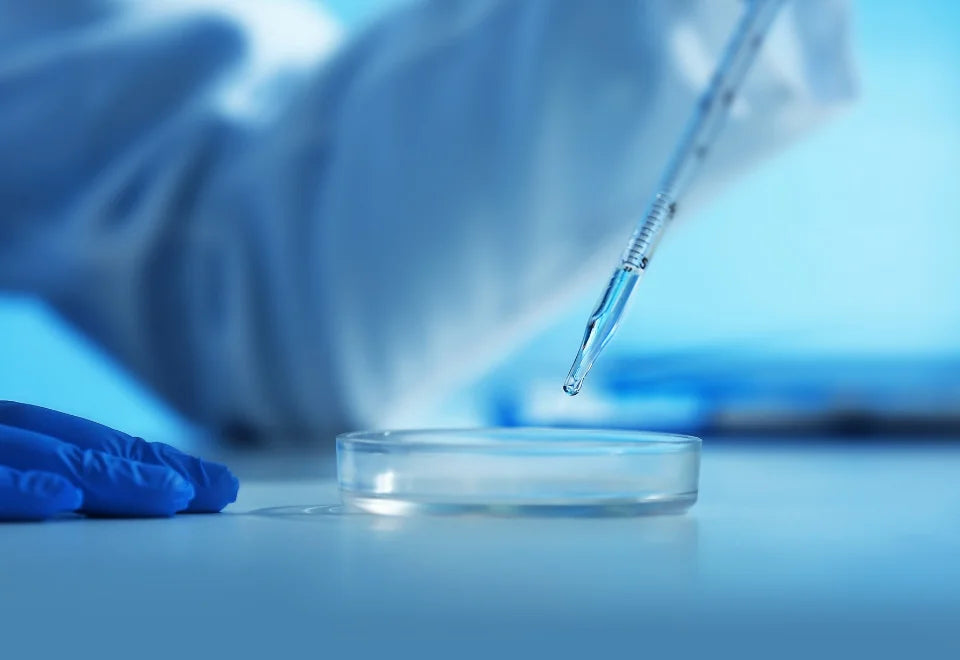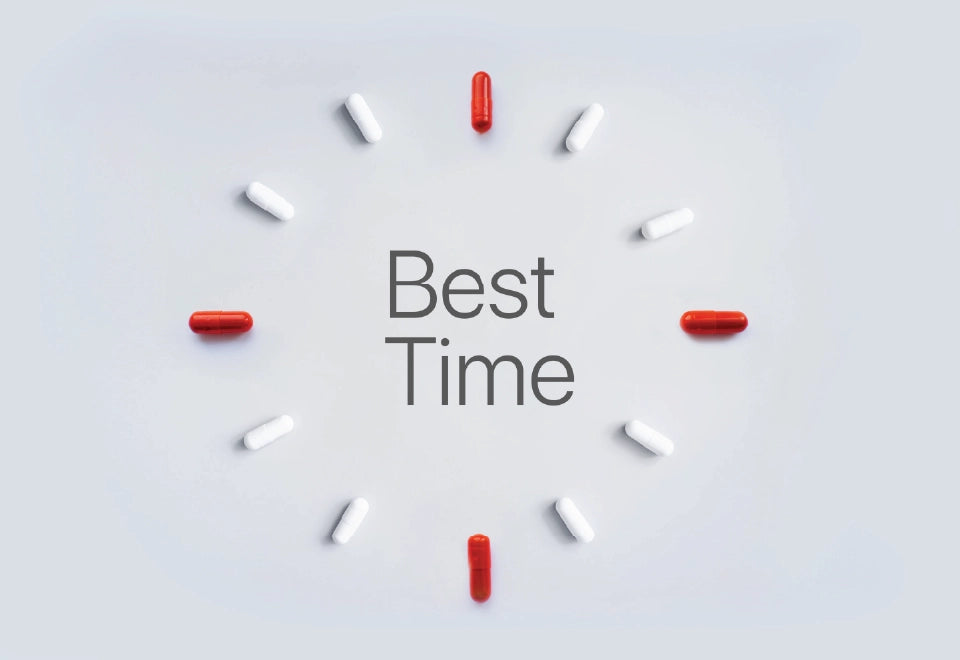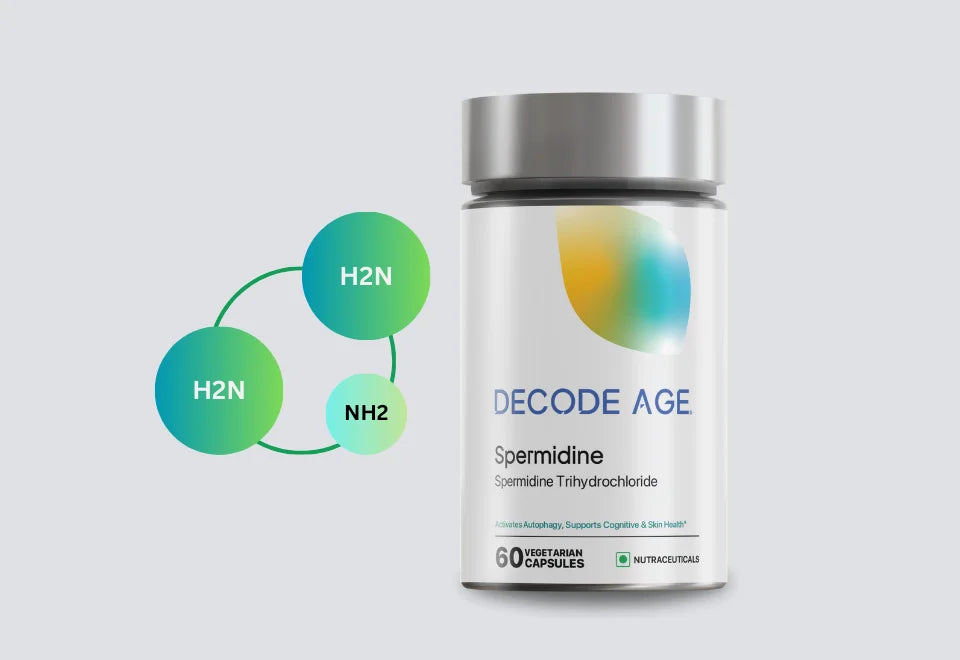Most people focus on what supplements they’re taking but forget to ask when they should take them. Our biological processes follow a circadian rhythm, a 24-hour internal clock that governs hormone release, cellular repair, and energy use. Timing your longevity supplement around these natural rhythms can drastically improve how well your body absorbs and uses them.
"Your body’s clock is ticking and timing your supplements right could be the key to extending it." - Dr. Satchin Panda, Circadian Biologist, Salk Institute
Morning Supplements: Energy, Resilience, and Cellular Activation
NMN (Nicotinamide Mononucleotide)
NMN (Nicotinamide Mononucleotide) plays a key role in replenishing NAD+ levels, a coenzyme essential for mitochondrial function, DNA repair, and sirtuin activation. These sirtuins are involved in longevity regulation, cellular repair, and metabolism. Since your cellular activity, metabolism, and energy demands peak in the morning, aligning NMN intake with this biological rhythm enhances its efficacy. Taking NMN in the morning also coincides with a natural cortisol surge, further boosting its absorption and utilization.
Synergistic Benefits of NMN
NMN works synergistically when paired with Resveratrol, which activates SIRT1, and TMG (Trimethylglycine), which supports methylation. This is especially important because NAD+ biosynthesis can deplete methyl groups, potentially impacting liver and cardiovascular health if not balanced.
Studies demonstrated that mice receiving NMN in alignment with their active phase (analogous to morning in humans) showed better mitochondrial energy production, reduced oxidative stress, and improved muscle function. This suggests that morning NMN not only fits physiological demands but also maximizes its anti-ageing potential.
Resveratrol
Resveratrol is a powerful antioxidant and polyphenol best known for activating SIRT1, a longevity-associated protein that regulates mitochondrial health, DNA repair, and anti-inflammatory pathways. When taken in the morning, resveratrol complements the body's natural spike in cortisol, helping to stimulate metabolism and mental clarity. This timing also supports circadian rhythm alignment, which is crucial for its gene-modulating effects.
Resveratrol works even better when combined with NMN, as it helps extend the boost in NAD+ levels provided by NMN supplementation. This pairing can enhance energy production and cellular maintenance throughout the day, especially when cortisol and insulin sensitivity are naturally optimized.
Studies emphasized that resveratrol, when timed in sync with the body’s circadian rhythm, significantly influences the expression of genes related to cellular protection, metabolism, and inflammation. This makes morning intake not only convenient but biologically strategic.
Note: Being fat-soluble, resveratrol needs a small amount of dietary fat to be absorbed effectively. Consider taking it with a healthy fat source such as ghee, MCT oil, or avocado for improved bioavailability and gut tolerance.
TMG (Trimethylglycine)
TMG, or Trimethylglycine, plays a vital role in supporting the body’s methylation pathways, biochemical processes that regulate gene expression, detoxification, and neurotransmitter production. One of TMG’s key benefits is its ability to donate methyl groups, which are required to convert homocysteine, a potentially harmful amino acid, into methionine. Homocysteine naturally rises in the early hours due to overnight metabolic processes, and high levels have been linked to increased cardiovascular and neurological risk. Taking TMG in the morning helps counteract this spike and supports a healthier metabolic profile.
Moreover, when supplementing with NMN, it's essential to ensure adequate methylation capacity. NMN boosts NAD+ levels, but this process utilizes methyl groups. Without support, the body could enter a methylation deficit state, potentially triggering fatigue, headaches, or impaired detoxification. TMG fills this gap by providing the necessary methyl donors, thereby enhancing NMN's benefits without compromising the methylation cycle.
Beyond its biochemical role, TMG has been shown to help combat physical and mental fatigue. Many individuals experience enhanced alertness, better focus, and greater stamina throughout the day. Taking TMG in the morning sets a strong foundation for optimal cognitive and physical performance, making it a smart addition to any longevity stack.
Noon Supplements: Anti-Inflammatory & Metabolic Balance
Fisetin
Fisetin is a flavonoid and potent senolytic compound that targets senescent cells (damaged or aged cells that no longer divide but release harmful pro-inflammatory signals). These senescent cells are linked to age-related decline and chronic diseases.
Noon is a strategic time for fisetin supplementation because the body's immune system activity stabilizes during this part of the day. This timing avoids disrupting hormonal processes like melatonin production, which occurs later in the evening, and aligns with the body's natural cleanup and maintenance rhythms. It is also a time when blood sugar and metabolic states are more stable, improving the compound's absorption and efficacy.
To optimize fisetin’s bioavailability, it's recommended to take it with a meal that includes healthy fats such as olive oil, avocado, or nuts, since fisetin is fat-soluble. This combination enhances its absorption in the digestive tract and reduces the risk of gastrointestinal discomfort, which can occasionally occur with high doses. When taken consistently, fisetin supports longevity by improving inflammatory balance, protecting neurons, and enhancing metabolic health.
Highlight: According to trials from the Mayo Clinic and supporting research, Fisetin has demonstrated the ability to lower inflammation markers and improve insulin sensitivity. It has also shown neuroprotective benefits and supports better vascular health. Incorporating it at mid-day, when the body's metabolic processes are relatively calm, ensures both effectiveness and tolerability.
Ca-AKG
Ca-AKG (Calcium Alpha-Ketoglutarate) is a vital compound in cellular energy production and a prominent player in the Krebs cycle, making it an effective supplement for midday use. Noon is increasingly recognised as an ideal time for taking Ca-AKG, due to its alignment with the body's midday metabolic shift. At this time of day, the body is shifting from a high-energy, cortisol-fueled morning into a more balanced state, making it an opportune window to introduce compounds that support cellular equilibrium and anti-inflammatory processes.
Ca-AKG (Calcium Alpha-Ketoglutarate) contributes to several mid-day physiological needs, including stabilising mood, supporting cognitive clarity, and modulating inflammation.
Midday intake allows Ca-AKG to optimise the body's transition from stimulation to maintenance mode without clashing with cortisol spikes or evening melatonin release. It supports steady energy levels, sharpens post-lunch focus, and contributes to muscle preservation, bone density, and tissue stability, all of which are especially relevant for those targeting healthy ageing.
Additionally, taking Ca-AKG around noon complements the body's natural digestive rhythm and post-prandial metabolic activity. This ensures better absorption and helps buffer against oxidative stress generated after meals. When paired with a balanced lunch, preferably including some protein, Ca-AKG enhances nutrient signaling and cellular housekeeping processes that reinforce long-term health and vitality.
Night Supplements: Repair, Detox, and Deep Recovery
Magnesium
Magnesium is a critical mineral involved in various biochemical reactions in the body, many of which are essential for rest and repair. Magnesium is especially valued for its calming effect on the body and mind, making it an excellent option for those who experience stress, anxiety, or restlessness at bedtime. It also helps regulate neurotransmitters like GABA (gamma-aminobutyric acid), which promotes a relaxed state, reduces mental chatter, and facilitates the onset of sleep.
Taking magnesium in the evening aligns with the body’s natural circadian rhythm and supports the processes of muscle relaxation and neurological decompression that occur during sleep. It helps ease muscle tension, reduce nighttime cramps, and balance blood sugar levels during the night, all of which contribute to deeper and more restorative sleep. For best results, magnesium should be taken 30 to 60 minutes before bedtime with water or a calming herbal tea like chamomile or lemon balm.
Spermidine
Spermidine is a naturally occurring polyamine that plays a vital role in cellular renewal and longevity. It activates autophagy, the body's process of breaking down and recycling damaged cellular components, which is critical for preventing the accumulation of dysfunctional proteins and organelles that contribute to ageing. Since autophagy is most active during deep sleep, taking spermidine at night allows it to work in harmony with your body’s natural repair cycle.
Studies suggest that spermidine enhances cardiovascular function, supports memory retention, and may extend lifespan by promoting more youthful cellular function. It also has neuroprotective properties, making it particularly valuable for brain health as we age. Regular nighttime supplementation can contribute to reduced inflammation, improved metabolic efficiency, and better resistance to oxidative stress.
For best results, spermidine should be taken with a light, balanced dinner or shortly afterward. Pairing it with magnesium and collagen creates a synergistic nighttime recovery stack — one that addresses autophagy, skeletal tissue repair, and nervous system regulation. This trio supports whole-body restoration and ensures your sleep hours are as regenerative as possible.
Collagen
Nighttime collagen supplementation is a strategic choice for supporting the body’s natural repair and regeneration cycles. Collagen is a structural protein that plays a critical role in maintaining the integrity of skin, joints, tendons, and gut lining. During sleep, the body enters a deep restorative phase marked by elevated secretion of growth hormone, which enhances protein synthesis and tissue repair. This makes nighttime an ideal window for providing your body with the raw materials it needs for optimal renewal.
Supplementing with collagen before bed ensures a steady supply of amino acids like glycine, proline, and hydroxyproline, which are essential for collagen formation. When taken consistently at night, collagen can improve skin hydration and elasticity, reduce joint stiffness, and aid in repairing the gut lining, especially in individuals with digestive challenges. To maximise its benefits, collagen can be mixed into warm herbal tea or taken alongside magnesium for a synergistic sleep and recovery effect.
Extra Tip: Vitamin C plays a pivotal role in collagen formation. It acts as a cofactor for the enzymes that stabilize and cross-link collagen molecules. Hence, adding a vitamin C-rich food or supplement to your morning routine supports the body’s ability to effectively use the collagen taken the night before.
Note: While nighttime is an ideal window for collagen due to the body’s repair processes during sleep, it is a highly flexible supplement that can also be taken in the morning or afternoon. Consistency matters more than timing for collagen, so choose the time that best fits your daily routine.
Fisetin
Fisetin taken at night complements the body’s natural regenerative processes that are most active during sleep. During the night, your body shifts into a deep restorative mode, a time when immune surveillance increases, tissue repair is prioritized, and cellular waste is cleared. Fisetin supports this internal cleansing by targeting senescent cells, reducing systemic inflammation, and promoting healthier tissue environments.
By aligning fisetin supplementation with the sleep phase, you allow it to enhance the body's detoxification and cellular rejuvenation mechanisms. This may result in improved tissue elasticity, reduced age-related cellular burden, and neuroprotective benefits over time. For individuals focused on anti-ageing or managing chronic inflammation, nighttime fisetin offers a practical and effective way to reinforce these goals without interfering with daytime energy cycles. Taking it with a light, fat-containing dinner or shortly before bed can further enhance its absorption and impact.
Mistakes to Avoid
Avoid NMN or Resveratrol at Night. These compounds are energy boosters that activate cellular pathways involved in metabolism and alertness. Taking them in the evening or before bedtime can stimulate the body at a time when it should be winding down, potentially interfering with melatonin release and disrupting the circadian rhythm. This can lead to sleep disturbances, shallow sleep, or difficulty falling asleep.
No Fisetin on an Empty Stomach. Fisetin is a fat-soluble flavonoid and consuming it without food may lead to poor absorption and gastrointestinal discomfort, including nausea. To avoid this and enhance its bioavailability, it should be taken with a meal that includes healthy fats.
FAQs
What is the best time to take NMN and resveratrol together?
The ideal time is in the morning. NMN boosts NAD+ for energy production, and resveratrol activates sirtuins. Morning timing supports natural cortisol and metabolic activity, maximizing absorption and results.
Can I take Fisetin at night instead of noon?
Yes, Fisetin is effective both at noon and night. Noon supports immune balancing and detox, while night enhances repair and senescent cell clearance. Choose the time based on your lifestyle or stack preferences.
Is it okay to combine magnesium, collagen, and spermidine at night?
Absolutely. These three work synergistically to enhance sleep quality, repair tissue, and activate autophagy. They form an effective nighttime recovery stack for anti-ageing and longevity.
Should I take Ca-AKG before or after lunch?
Ca-AKG is best taken shortly after a balanced lunch, ideally one with protein. This supports absorption, stabilizes midday energy, and aligns with your body’s shift from activity to cellular maintenance.
What happens if I take all supplements together?
While not harmful, it may reduce benefits. Some supplements, like NMN or resveratrol, are stimulating and best for mornings, while others, like magnesium and spermidine, support rest. Time them correctly for best results.
Is it important to take Resveratrol or Fisetin with food?
Yes, it’s important to take resveratrol and fisetin with food because they are fat-soluble compounds. When taken with a meal that includes healthy fats like avocado, nuts, or olive oil, their absorption significantly increases. This also helps reduce any potential stomach discomfort, ensuring you get the most benefit from these supplements.




























Leave a comment
All comments are moderated before being published.
This site is protected by hCaptcha and the hCaptcha Privacy Policy and Terms of Service apply.